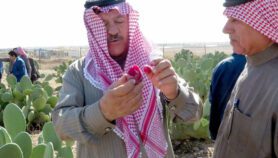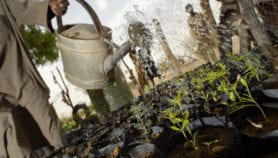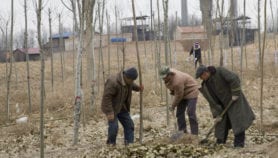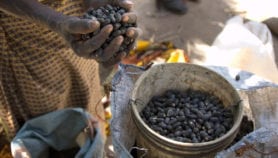Send to a friend
The details you provide on this page will not be used to send unsolicited email, and will not be sold to a 3rd party. See privacy policy.
[LONDON/BAMAKO] Extracts from melon and guava, as well as beer and boric acid, can together make an irresistible, yet potentially fatal, trap for mosquitoes in arid and semi-arid areas, according to scientists.
Researchers have demonstrated that fruit sugar is not just an optional food source for Anopheles mosquitoes, but is actually essential for their survival. They say that the discovery could help drastically reduce mosquito populations in areas where these sugars are hard to come by.
They proposed the production of ‘attractive toxic sugar bait’ (ATSB), which can be sprayed onto patches of vegetation to lure mosquitoes and kill them.
Scientists conducted field studies in two Israeli oases — one containing two flowering trees that provide a source of sugar that mosquitoes prefer, and the other containing no flowering trees.
They found that mosquitoes in the sugar-rich oasis increased the potential of mosquitoes to transmit malaria by 250-fold because it allowed them to survive for longer.
At the sugar-poor site, there were smaller numbers of mosquitoes and they had a shorter lifespan. Additionally, female mosquitoes in the sugar-poor site took longer to grow a batch of eggs — if the female’s lifespan was shortened by a lack of sugar, the eggs would not mature into vectors capable of malaria transmission.
"Mosquitoes must have sugar meals — usually, this is the first meal that they take [after being born]," Yosef Schlein, a professor at the Kuvin Center for the Study of Infectious and Tropical Diseases at Hebrew University, Israel, told SciDev.Net.
"People have known for a long time that natural sugars such as nectar are a primary energy source for mosquitoes. But the fact that it is really essential and that the lack of it is very damaging to mosquito population has escaped [their] attention until now."
Mahamoudou Toure, a researcher at the Malaria Research and Training Center at the University of Bamako, Mali, and co-author of a study that tested the use of ATSB — published in Malaria Journal last year — told SciDev.Net that, following a single application, they were able to reduce the mosquito population by 90 per cent along a stretch of road in a semi-arid district in Mali.
They sprayed vegetation with a solution of honey melon, guava, boric acid, beer and water. All of the ingredients can be bought cheaply and locally, and the acid is not harmful to humans.
Larger trials depend on finding more funding. Toure added that they need to ensure that the ATSB does not kill other, useful insects in the region.
Schlein said that the method could be extremely useful in Africa’s Sahel region. "Sahel countries are desert or semi-desert. And, generally, mosquitoes breed in areas surrounded by reeds [tall grasses] and weeds that don’t bear any flowers."
The Israeli study was published in PLoS ONE earlier this year (January).
Link to full paper in PLoS ONE ![]() [194kB]
[194kB]
References
PLoS ONE doi: 10.1371/journal.pone.0015996
Malaria Journal doi: 10.1186/1475-2875-9-210













